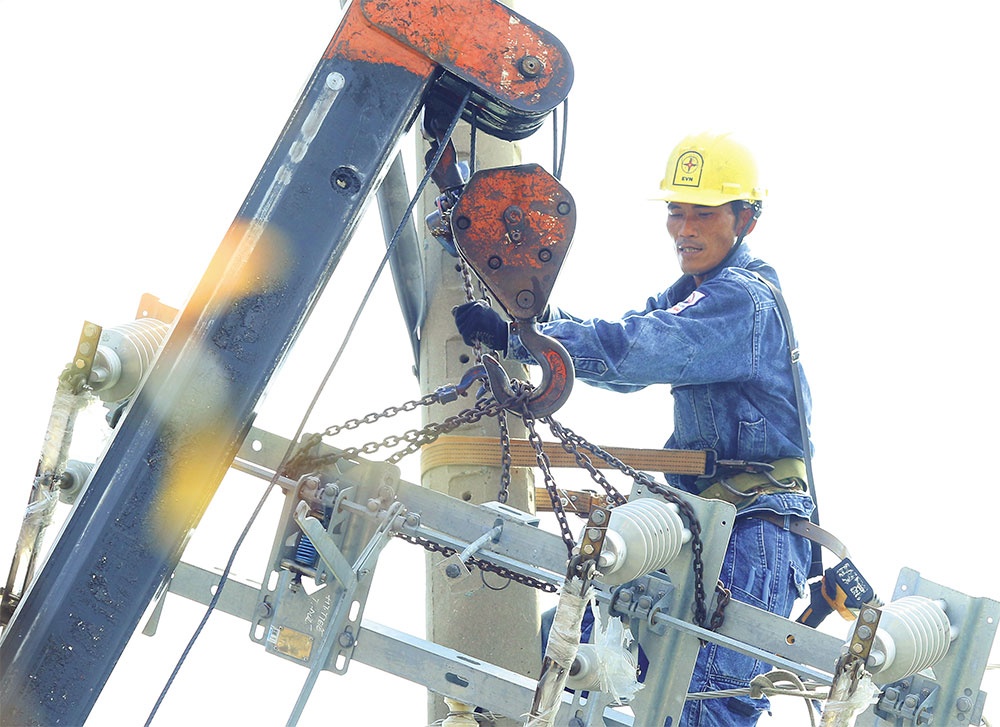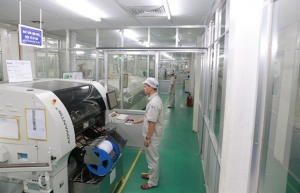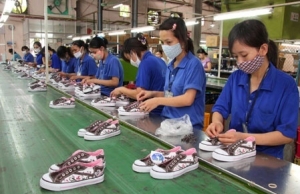INTERNATIONAL INVESTMENT
AND PORTAL
For years, the Vietnamese government has been looking for ways to reduce its direct ownership in key state enterprises and so to broaden private ownership. For many reasons, equitisation and divestment have not yet taken place on schedule or as intended.
 Some policies are currently inadequate at SOEs, such as renumeration for high-quality personnel, photo Le Toan
Some policies are currently inadequate at SOEs, such as renumeration for high-quality personnel, photo Le Toan
Recently, slow progress in equitisation and divestment of state-owned enterprises (SOEs) has been attributable to COVID-19, but the pandemic is only a recent cause. More fundamental causes are overpricing of shares, reluctance of local management to act, and bureaucratic inertia. Schedules have been set, and deadlines missed.
“The speed of equitisation and divestment remain slow, with the number of SOEs intended for these activities is small,” said a government report sent to the National Assembly (NA).
According to latest figures from the Ministry of Finance’s Department for Corporate Finance, state-run groups, corporations, and enterprises divested capital worth only $2.1 billion from enterprises, collecting $4.74 billion in September, and did the same with $20.26 million – collecting $99.56 million in the first nine months.
The government earlier expected that state capital collected from SOE divestment this year would be $869.56 million, but now it is uncertain if this will be reached.
Frowning upon this situation, Prime Minister Pham Minh Chinh said, “The rearrangement and renewal of SOEs and state-run units have failed to meet requirements, and the role of state-owned groups in partaking in large-scale works and projects has also failed to be promoted.”
NA deputy Tran Hoang Ngan, representing Ho Chi Minh City, has strongly urged the government to quicken reform of SOEs as soon as possible, which has been a bottleneck for economic growth and attraction of private investment.
“The restructuring, arrangement, and renewal of SOEs and state-owned units have failed to meet the requirements. It is necessary to promote strong restructuring of state-run groups, corporations, and SOEs, quickly handling inefficient enterprises, and further promoting their role in implementing major national projects,” Ngan said.”
Poor performance
The government cited reports from ministries, sectors, and localities as saying that as of late last year, Vietnam had 826 enterprises with state capital, including 673 SOEs and 153 enterprises having state capital and stake.
These enterprises had total assets worth about $163 billion, up 2 per cent as compared to 2020, of which 33 per cent is fixed assets. Their equity sat at $78.26 billion, up 3 per cent over 2020. Total state capital invested at these enterprises was $72.6 billion, up 3 per cent as compared to 2020.
Notably, 11 per cent of the enterprises suffered from additional losses of $698.43 million, and 22 per cent of those incurred accumulative losses of $2.3 billion. The total debts of these groups last year reached $83.78 billion, of which 53 per cent is for short-term debts.
When it comes to the performance of enterprises wholly owned by the state, especially 75 groups and corporations whose total assets were valued at $118.7 billion, their short- and long-term debts from commercial banks and credit organisations stood at about $20 billion, such as PetroVietnam ($9.77 billion), Electricity of Vietnam or EVN ($4.77 billion), Vinacomin ($1.86 billion), Vinachem ($900 million), Viettel ($586 million), Vinafood I ($226 million), Vincem ($213 million), and Vinataba ($142 million).
These 75 groups and corporations also had total foreign loans of about $13.5 billion, including EVN ($7.1 billion), Vietnam Expressway Corporation ($2.68 billion), PetroVietnam ($1.03 billion), and Vietnam Paper Corporation ($90.87 million).
The government report revealed that the operation efficiency of SOEs has failed to meet desired goals, while their investment efficiency was not as high as expected when the projects were adopted. Many projects with huge investments has failed or incurred losses for many years while the restructuring plans did not work.
The report also showed that SOEs’ total revenue in 2021 decreased 12 per cent as compared to that in 2020. Pre-tax profit also declined 20 per cent. Many of them earned a low ratio of pre-tax profit to equity, as much as 1-5 per cent, which was below the average banking deposit interest rate. Over 80 out of 400 reported accumulative losses for many years in a row.
Moreover, SOEs in general have failed to play their role in driving the development of other sectors and promoting value chain linkage. They also remain feeble in sectors that influence the improvement of the economy’s competitiveness such as high technology, precision mechanics, component manufacturing, and source technology. Most SOEs in key sectors operated in a close-ended manner, which did not create conditions for other enterprises to participate in their value chains.
Demand for bigger renewal
Last week, the NA adopted a resolution on Vietnam’s Socioeconomic Development Plan for 2023, with a growth rate of 6.5 per cent. To make the plan feasible, a series of tasks are to be implemented, including drastic reform of SOEs.
“Efforts are to be made to boost restructuring in order to mobilise more state resources into national socioeconomic development,” said PM Chinh.
The government ordered the rapid restructuring in the 2021-2025 period earlier approved by authorised agencies, with openness, transparency, and reform contents ensured in line with the law.
“We will continue divestment under norms and classification categories of SOEs cared in the prime minister’s Decision No.22/2021/QD-TTg dated July 2021 on SOE reform, especially poorly performing enterprises with state capital lost. They must focus on their core business sectors, and no ineffective investment is allowed,” said the government report. “There will be effective solutions to mobilise resources into national socioeconomic development, especially in the number of sectors such as energy, transport infrastructure of national importance, digital transformation infrastructure, and supplies of important input materials for production.”
From now until 2023, the government will soon review and make comprehensive assessments on the performance of all SOEs, and all state-owned projects, works, capital, and assets in order to devise suitable restructuring solutions.
“There will also be proper solutions to make SOEs healthy financially, with radical settlement of financial stagnations, insolvency, and assets that cannot produce profits in groups, corporations, and member companies,” the report stressed. “There will also be new mechanisms and policies to review the management of owners, facilitating the development of a number of major SOEs that can help promote the development of some key economic sectors and lead the development of enterprises of other economic sectors.”
The government has set a target of having at least 25 SOEs with a market capitalisation of $1 billion, in which there will be at least 10 with over $5 billion.
According to Minister of Finance Ho Duc Phoc, SOEs are slow to innovate, meaning they fail to keep up with the rapidly changing requirements of the market-based economy. He pointed out that the inadequate policies for managing them remain a major cause behind their slow innovation and confusion in formulating business and investment strategies and plans. “The legal framework for management and usage of state capital at SOEs should be reviewed and improved in line with the amendments to the Law on Bidding and the Law on Land to ensure efficiency,” Phoc said.
According to Minister of Planning and Investment Nguyen Chi Dung, SOEs need to focus on research and development, digital transformation, infrastructure development and finance to create growth drivers. It is necessary to ameliorate policies and mechanisms for the management to enable them to operate under the market-based mechanism, he said.
According to international organisations such as the Asian Development Bank and the World Bank, though Vietnam’s economy has seen high growth, quality and competitiveness remain problematic. One of the reasons is the slow-paced equitisation and restructuring of SOEs, which has been impeding private enterprises and investors from engaging more in the sectors currently held by the state.
Tran Nguyen Tam Huong - Associate, Russin & Vecchi

Improving transparency and disclosure by SOEs and agreement on an acceptable form of valuation are of critical importance for them to achieve equitisation. Towards this end, they should be subject to the same high-quality accounting and auditing standards as are listed companies. Large SOEs should use internationally recognised standards, and their accounts should be audited by independent external auditors.
The government continues to improve the legal framework for SOE equitisation, divestment, and restructuring. Although the government has promulgated regulations for equitisation, the inadequacy of some provisions remains. It is necessary to have guidelines in order to settle obstacles which arise during negotiations.
Using methodology used to settle on a price for an initial public offering of SOEs is one avenue. Often this is pure market judgement and not the result of an application of fixed rules. Sometimes rules based on an auction mechanism will work well.
The government must hasten to encourage foreign investors to participate in equitisation of SOEs. Preferential but selective policies for foreign investors could work – for instance, increasing the limits on foreign ownership or application of tax preferences.
In a sign of positive movement, the Commission for the Management of State Capital at Enterprises has been assigned the task to create a scheme to encourage foreign investment in the purchase of shares in SOEs.
Before equitisation, the government should work with SOEs to handle special or unusual difficulties, to remedy methods to reduce loss, to improve management capacity, and to provide a mechanism where even a minority owner has realistic levels of input.
In those enterprises where there is no point for the state to hold capital, the government can accelerate the process to divest completely from such businesses or to close the business. Of course, this is not a new idea, and the government has followed such a course in many instances.
The government holds meetings and conducts workshops with SOEs and investors to find ways to support them in the equitisation process. This is an opportunity for the government to receive feedback and understand the approach of foreign investors. This gives the government a basis to make appropriate changes, amendments to policies designed to accelerate equitisation.
Equitisation has brought positive changes. But as practised, there are limitations, especially when the target investor is a foreign company. But SOE equitisation is a prolonged process with many obstacles.
The government will need to continue to examine its approach, take more market-friendly measures to ensure that the objectives can be achieved and, when foreign investment is the objective, find ways to interest foreign investors to participate in equitisation.
Raymond Mallon - Senior economist

The ongoing challenge for the Commission for the Management of State Capital at Enterprises is to continue to strengthen its capacity with sufficient numbers of suitably qualified and professional independent experts to work with the ownership agency to professionally manage its assets to maximise performance and returns and to manage financial and other risks.
Systems and personnel need to be developed to provide more transparent reporting, benchmarking, and other accountability mechanisms.
The commission also needs to be able to mobilise professionals to serve on the SOE boards. More broadly, there is a need to accelerate efforts to train corporate governance experts and to build a corporate governance profession in Vietnam.
Vietnam’s Institute of Directors (VIOD) was established in 2018 as a professional organisation to promote corporate governance standards and best practices in the Vietnamese corporate sector. This is a potentially important step towards building the national capacity required to strengthen corporate governance in Vietnam.
In my home country, the Australian Institute of Company Directors plays a critical role in this area. Cooperation between the VIOD and similar regional director training and advisory institutes will be one approach to building national capacity.
Another key policy challenge is to promote competitive neutrality to ensure that SOEs compete on equal footing with private enterprises. The principle of competitive neutrality has been a cornerstone of Australian SOE and competition policy reforms. Many of Vietnam’s recent economic reforms have been moving in this direction.
SOEs are now governed subject to the same Law on Enterprises and must comply with the Law on Competition and other legislation aimed at promoting the development of competitive markets.
In this respect, Vietnam has moved further towards good practice than some countries in the Organisation for Economic Co-operation and Development (OECD). Roughly a quarter of OECD countries still have SOEs with a legal status that shields them from the full application of private company laws.
Vietnam’s telecommunication sector provides an example of how well-regulated competitive markets can foster innovation and improvements in the quality of public services, even when the competition is mainly between different SOEs.
While remaining largely state owned, Vietnam’s telecommunications sector has transformed from one of the most rudimentary systems in Southeast Asia in the mid-1980s to one of the more dynamic sectors, and now boasts comparatively high levels of access to quality low-cost telecommunications and internet services.
 Solving the puzzle of foreign interest in SOE equitisation
Solving the puzzle of foreign interest in SOE equitisation
For years, the Vietnamese government has looked for ways to reduce its direct ownership in key state companies and so to broaden private ownership. For many reasons, equitisation and divestment have not yet occurred on schedule or as intended.
 Vietnam needs drastic SOE restructuring: experts
Vietnam needs drastic SOE restructuring: experts
Deputy Prime Minister Le Minh Khai has signed a decision to deepen the restructuring of state-owned enterprises (SOEs) in 2021-25.
 Accuracy in SOE valuation must improve
Accuracy in SOE valuation must improve
It was essential to tackle bottlenecks in determining the corporate value of State-owned enterprises (SOEs) to ensure the accuracy of valuation and speed up the equitisation process, according to the Ministry of Finance.



















